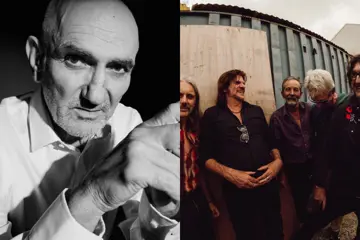It's estimated that more than 100 million people worldwide tuned into the face-off between Hilary Clinton and Donald Trump at the first American presidential debate. That's a mind-boggling figure in itself, but what makes it truly remarkable is the fact that a surprising proportion of that number were not citizens of the United States. There's a very good reason why so many people from every corner of the globe have such a vested interest in an election in which they have no democratic input: when a candidate with views as divisive and discriminating as Donald Trump's makes a bid to become a world leader, it says something deeply troubling about the politics of humanity.
Speaking to Bruce Gladwin, artistic director of Back to Back Theatre, it's just a few hours after this historic debate and the resonances this event share with his company's particular brand of performance feels significant. Most of the actors in the Back To Back ensemble live with perceived intellectual disabilities and so their work is innately underpinned by a politicised commentary on the role of those considered "different" by society. It's little wonder that the question of how world figureheads promote tolerance and integration is close to this company's heart.
"One of the actors involved has difficulty with memory and retaining her lines, so we've embroidered her words all over her scene partner's costume."
"I feel it's a responsibility of artists to show leadership by defining what humanity is," Gladwin explains as we discuss the presence of the political in Back To Back's shows. "Artists have to be advocates for 'otherness' and that's something which is particularly important to Back To Back. Our work aims to open people up to these ideas through storytelling that has a strangeness to it. It can be intriguing and delightful but also embarrassing or awkward or shameful. We try to avoid being explicitly didactic: I'm far more interested in the way a bewildering dream can shift a person's perspective and make them question."
This layered, often playful yet thought-provoking style, superimposing the surreal with the stoic, is deliberately tilted towards challenging existing stereotypes of the disabled, Gladwin says. "I remember the first time I saw the company as an audience member. I was struck by the irony that this was a company featuring actors with intellectual disabilities and yet the work was so intellectually stimulating. The fact that the common associations with the word "disabled" were the polar opposite of my experience really excited me. These phenomenal actors have important and fascinating viewpoints on the world, not just on disability."
Don't miss a beat with our FREE daily newsletter
In 2012, Back To Back's Helpmann Award-winning play Ganesh Versus The Third Reich wrestled with the dangers of legislated discrimination via a whimsical yet confronting study of the Nazi's admiration for eugenics. The company's latest piece, Lady Eats Apple, which will receive its world premiere at the Melbourne Festival, has swapped the geo-political for the metaphysical. It is a meditation on creation mythology, touching on euthanasia and concepts of the afterlife, the relationship between disability and spirituality, and the function of social hierarchies.
The piece began its life as a simple exercise in how to make a theatrical tragedy. "Death was the obvious starting point. Unsurprisingly it's quite prolific when you look at the history of tragedy in theatre," Gladwin observes. "But from here we started thinking about spiritualism and mediumship, which in turn led us to hypnotism and other ways of inducing a trance and then conversations about near death experiences. We found that a lot of these discussions, despite being about big, weighty topics, were actually very intimate, so while we're exploring grand, theological concepts, there's also something quite domestic to the narrative as well."
Gladwin's approach to theatre-making is thoroughly collaborative. Partly, this is a necessity to allow Back to Back's actors to contribute in ways in which they feel safe and comfortable. "Sometimes the process is very fluid and organic and sometimes it's very difficult but what's crucial is that we find a way of working together that isn't necessarily self-reflective or intrusive." An example of this in Lady Eats Apple comes at a moment when a forbidden romance is revealed. "One of the actors involved has difficulty with memory and retaining her lines, so we've embroidered her words all over her scene partner's costume. The result is incredibly beautiful, as they read off each other's clothes. So, something that comes from a process of finding a working methodology can lead you to something completely extraordinary and powerful."
In this new production, Back To Back will be blowing up the Hamer Hall but it's not what you think. The piece will be staged in an experimental inflatable theatre that will fill the concert hall's auditorium. For Gladwin, creating a subversive stage is part and parcel of working with such a subversive company. "Making work on such a large scale is a comment on power in its own right. There's an aspect of us pushing ourselves, asking, 'Can we pull this off?' Even the narrative is epic in scale; it starts at the beginning of time and ends in the present day, which is just about the biggest journey you could chart. It's a bit audacious, but showing that we can play large spaces and venues where traditional theatre takes place puts us alongside those other organisations and institutions. It gives our voice credibility."















